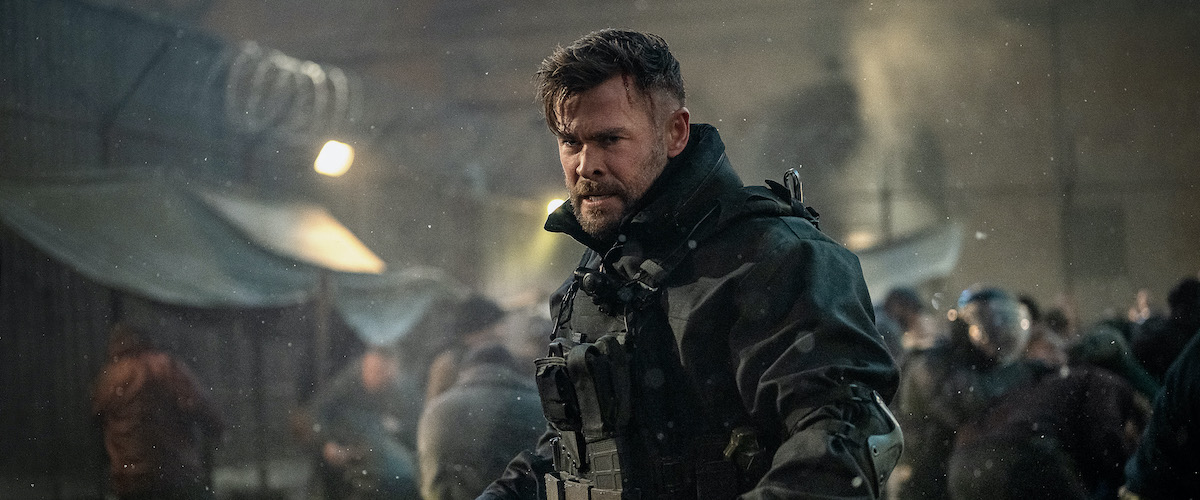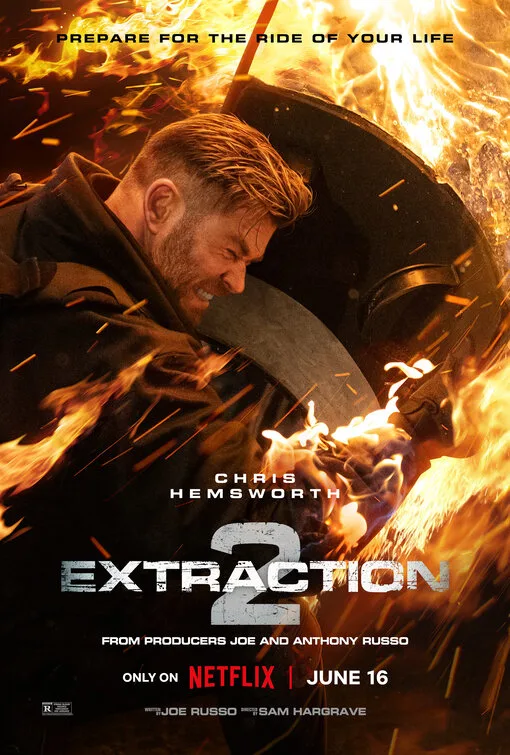Overseen and conceived by the Russo Brothers of Marvel fame, the “Extraction” films are an example of a dwindling breed: the big-budget, super-violent adventure. Whether the main character is named John Rambo, Jason Bourne or John Wick, he’s a variant on a type: the prolific killer who’d prefer not to kill anymore but keeps getting pushed back into it. He has a tragic past and is grieving over it. And he’s played by a guy who’s so ferocious in violent scenes that you’d believe that he could take 100 blows to the head, face, and torso, plus a gunshot, a knife wound, and a grenade concussion, and keep going.
Critic Robert Brian Taylor calls these movies part of “The Sad Action Hero canon.” Chris Hemsworth is its most notable new member. He plays Tyler Rake—a young boy’s idea for an action hero name, but Hemsworth makes him seem almost like a real person. He’s a tremendous physical actor, possibly as good as Schwarzenegger and Stallone in their primes, but with more range. He’s played a scheming male bimbo, a legendary computer hacker, a depressed mercenary, a 19th-century whaler, a cult leader, and the mighty Thor, all convincingly. He’s got a bit of the young Sean Connery’s self-aware swagger as well. But there’s also a buried sadness to him, and that’s what the “Extraction” films dig out.
Tyler used to be a special forces soldier with the Australian Army. He chose to go to Afghanistan for yet another tour of duty while his son was battling an incurable disease and was not present when the boy died. Then his marriage fell apart and he became a mercenary. Guilt over husbandly and parental failure is as much of a driving force in the “Extraction” franchise as amnesia in the “Bourne” films and mourning in the “John Wick” series. Tyler’s adventures are redemption stories, set in action movie purgatories filled with shadow versions of the hero: defective fathers who mistreat, neglect, or warp their children and see them as extensions of their ego or brand. Tyler’s main enemies are dark parents who could be stand-ins for Tyler’s own masochistic feelings about how badly he failed his family.
The first “Extraction” showed Tyler rescuing the kidnapped son of an Indian drug lord who was being held in Dhaka, Bangladesh. The kid was a pawn in a pissing match between rich bullies with private armies. In accepting the mission Tyler offered himself up as a karmic punching bag, absorbing punishment for his past mistakes in an urban hellhole-purgatory (in the original graphic novel, the setting was Paraguay) while serving as a quasi-father figure to the boy he was protecting. In this one, an unnamed man (Idris Elba, so charming that one hopes he’ll be in the third one) shows up at the cabin in the woods where Tyler is recovering from the previous mission and delivers a message from his ex-wife, who, as it turns out is Georgian. Her sister and her children are being held in a Georgian prison by her drug dealer husband Davit (Tornike Bziava), who had the clout to get them all ensconced with him. Rake is hired to bust the family out of prison and take them away from Davit and his brother Zurab (Tornike Gogrichiani), who’s even more of a psycho. Complications ensue. All you need to know is that the film is three long action sequences with a bit of character development sprinkled in.
The first is an uninterrupted 21-minute action sequence following Tyler and the family through a wild prison break and onto a train that’s chased across the tundra by helicopters filled with armed thugs in body armor. Any thugs who aren’t killed in midair drop onto the train and fight Tyler and his two allies, Nik (Golshifteh Farahani) and Yaz (Adam Bessa), with guns, fists, knives, and whatever objects are lying around. Director Sam Hargrave, a former stunt coordinator who made his directorial debut on the first “Extraction,” takes the digitally-stitched-together, super-long “oner” that was introduced to viewers in mid-aughts films like Steven Spielberg’s “War of the Worlds” and Alfonso Cuarón’s “Children of Men” and pushes it to ostentatious but admittedly dazzling extremes.
Like the long take in the original “Extraction,” it has a video game feeling. Cinematographer Greg Baldi’s camera often adopts a first-person or over-the-shoulder vantage point, as in a “shooter” game. The point-of-view moves in and out of moving train cars, varies its distance to get tight closeups of people’s anguished faces or panoramas full of moving vehicles and people, and generally does things that are against the laws of physics as well as the rules of production insurance companies. Despite the Eastern European blue-gray filters and bloodletting and bone-crunching, you’re aware that that the sequence is no more “real” than the Avengers battling Thanos. Some composited landscapes and helicopters don’t pass the believability test, and a few big camera moves that take us from outside to inside and vice-versa are too clever for their own good. But it’s all so intricate and expertly timed that you still appreciate it, as one might a performance of a piano concerto so difficult that just hitting the notes is beyond most players’ capabilities.
The other two major sections of the film are modeled, respectively, on the first “Die Hard” and one of John Woo’s classic doppelgängers-battle-each-other films (probably “The Killer,” which like this film, climaxes in a candlelit church with doves fluttering about). They’re imaginatively conceived and executed with no-fuss virtuosity, though the cutting is sometimes too frenetic and the camerawork too wobbly (a lot of the time, Hargrave is doing a modified version of that Russo Bros’ “shaky equals excitement” style). But they face the unusual problem of being good enough to anchor nearly any other action epic yet feeling like a letdown because they follow that jailbreak-to-railway sequence.
There’s also a subplot about one of the ex-sister-in-law’s kids, Sandro (Andro Japaridze), who has been trained from birth to be a gangster just like his dad and uncle, supposedly being torn between recognizing his family’s multigenerational legacy of violence and brainwashing and choosing to go in a different direction, or taking up arms against the hero to get payback for Tyler killing one of his loved ones during the jailbreak. Anybody who’s seen a Sad Action Hero movie knows how this part of the story will turn out—they’re not going to write out Chris Hemsworth—so you play the waiting game.
Hemsworth and his castmates are thoughtful, capable actors. They take this assignment seriously. They dig into the psychological trauma and guilt aspects of Joe Russo’s script, imbue them with a “graphic novel” variant of seriousness (i.e., pulp fiction played solemnly), and elevate “Extraction 2” beyond glorified video game status. But there’s not enough dramatic substance, either in the writing or the marketplace-capped amount of screen time, to satisfyingly flesh out Tyler and his immediate circle. The film is single-mindedly focused on giving viewers more and more and more bang-bang. It wants to be a John le Carré novel and a cinematic equivalent of a shooter game at the same time. The first “Extraction” nearly pulled it off in scenes where Tyler bonded with an old merc buddy played by David Harbour, who was even more cynical than Tyler and turned out to be untrustworthy. It gets close again here in a scene where Tyler faces his deepest regrets in conversation rather than as metaphors while in combat. But for the most part, the series hedges its bets to appeal to what it apparently considers its main audience: viewers who deem anything related to characterization and atmosphere to be “filler.”
Still, you might appreciate the series’ attempts to anchor military-adjacent shoot-’em-up adventures in something like reality, and give all of its major characters situations to play that are a step above the standard action film tropes. Where most contemporary Hollywood movies are aimed at the child in every grownup, the “Extraction” films speak to the potential grownup in every kid. Although it’s rated “R,” its ideal audience might be 12. The scenes between parents and their disappointed offspring capture that feeling you have when you’re young and suddenly realize that the adults you once revered are human beings who can fail you and are often faking it.
Now playing on Netflix.




















